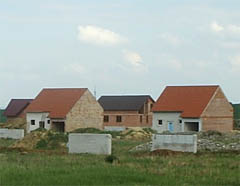
Kulhánek anticipates that the Senate will approve the amendment to the building law
 |
"The system is functional and navigable. It has been piloted with real users. It places us in a transitional period, where connection with the technological bypass will allow linking of today's functional system to the building authority systems that they worked with until July 1. Therefore, their comfort of work will be significantly greater than it is today," said Kulhánek.
In October, the government decided not to continue developing a digitized Information System for Building Regulation, which officials use. Currently, there is a transitional period during which officials can use new systems alongside the original ones. The builder's portal, however, continues to be adjusted, and according to the government's proposal approved in the Chamber, applications for building permits will still have to be submitted through it.
Karel Trpkoš, Deputy Minister for Regional Development and the Ministry of Labor and Social Affairs, tasked with leading the team working on digitization, stated at the seminar that the main goal was to stabilize the system and provide new components so that it operates in line with the new building act. It was necessary to resolve the process of uploading documentation, the automatic delivery of documents, and how to transfer large amounts of data to storage. Additionally, it was necessary to newly allow the portal's builders to upload documents without the condition of submitting applications and to make certain types of documentation accessible in the information system for officials.
At the same time, according to Trpkoš, it was essential to find a way to technically connect the digitized systems with the original ones from companies VITA and VERA and with the common electronic documentation registry. Subsequently, a business analysis had to be developed, and the future system for the digitization of building regulation defined. The transitional period will last until the beginning of 2028.
According to the Deputy Minister, all critical errors have been corrected so far, and the system has improved. However, he noted that some things are still unresolved. For example, the documentation updates in the system need to be refined, and its own infrastructure does not yet meet all standards. In the future, improving document preparation and setting some authorizations for work in the system will also be necessary.
Kulhánek mentioned at the seminar that the current state is not ideal, but it allows for the transition into a transitional period in which the digitization of building regulation can be completed. According to him, the main task of transitioning between systems and creating the amendment to the building act is to ensure legal certainty and stabilize the system.
However, representatives of the Czech Chamber of Architects or the Association of Towns and Municipalities (SMO) believe that this has not occurred. According to SMO Executive Director Radka Vladyková, the system is still not functional, and the legislative bypass does not retroactively protect officials from legal challenges. Officials are now forced due to the non-functional system to use other, currently illegal procedures for processing applications.
According to MP Robert Králíček (ANO), the agreement presented in the Chamber was different. By now, a functional system was supposed to be in place, while he claims that only a pre-production version exists. He therefore proposed to postpone the discussions in the Senate until the current version of the system is tested. He said he would recommend to ANO senators not to support the proposal. Kulhánek, however, believes that the Senate will behave in voting the same way as the Chamber of Deputies, where the amendment proposal was supported even by opposition deputies.
The English translation is powered by AI tool. Switch to Czech to view the original text source.
0 comments
add comment
Related articles
0
14.12.2024 | Experts describe the adoption of the amendment to the building law by the Senate as the only solution
0
25.08.2022 | ČKA and the Chamber of Commerce criticize the amendment to the building law
0
19.01.2022 | The government should approve the postponement of part of the construction law at the beginning of February
0
14.03.2017 | The coalition experts will still negotiate about the construction amendment
0
21.09.2016 | The government today approved an amendment to the building law
0
02.09.2014 | MMR will prepare an amendment to the Building Act by the end of the year
0
07.06.2012 | The major amendment to the building law is pending approval
0
07.05.2008 | The Chamber approved the amendment to the Building Act, overriding the Senate









